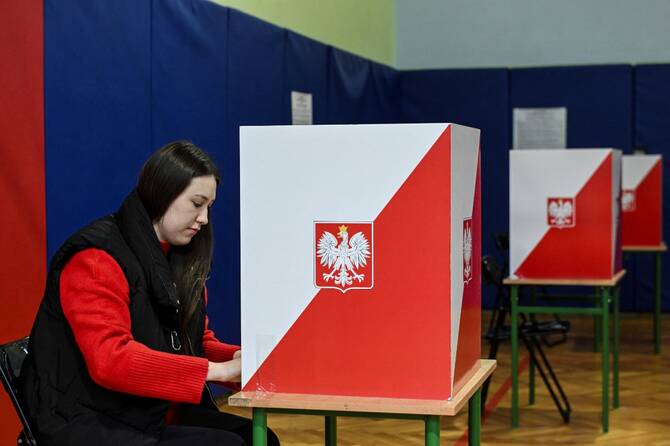WARSAW: Poles are voting Sunday in a presidential election at a time of heightened security concerns stemming from the ongoing war in neighboring Ukraine and growing worry that the US commitment to Europe’s security could be weakening under President Donald Trump.
The top two front-runners are Warsaw Mayor Rafał Trzaskowski, a liberal allied with Prime Minister Donald Tusk, and Karol Nawrocki, a conservative historian with no prior political experience who is supported by the national conservative Law and Justice party.
Recent opinion polls show Trzaskowski with around 30 percent support and Nawrocki in the mid-20s. A second round between the two is widely expected to take place on June 1.
The election is also a test of the strength of other forces, including the far right.
Sławomir Mentzen, a hard-right candidate who blends populist MAGA rhetoric with libertarian economics and a critical stance toward the European Union, has been polling in third place.
Ten other candidates are also on the ballot. With such a crowded field and a requirement that a candidate receive more than 50 percent of the vote to win outright, a second round seemed all but inevitable.
Polling stations opened at 7 a.m. (0500GMT) and close at 9 p.m. (1900GMT). Exit polls will be released when voting ends, with results expected by Tuesday, possibly Monday.
Polish authorities have reported attempts at foreign interference during the campaign, including denial-of-service attacks targeting parties in Tusk’s coalition on Friday and allegations by a state research institute that political ads on Facebook were funded from abroad.
Although Poland’s prime minister and parliament hold primary authority over domestic policy, the presidency carries substantial power. The president serves as commander of the armed forces, plays a role in foreign and security policy, and can veto legislation.
The conservative outgoing president, Andrzej Duda, has repeatedly used that power over more than the past year to hamper Tusk’s agenda, for example blocking ambassadorial nominations and using his veto power to resist reversing judicial and media changes made during Law and Justice’s time in power from 2015 to late 2023.
A Trzaskowski victory could be expected to end such a standoff. He has pledged to support reforms to the courts and public media, both of which critics say were politicized under Law and Justice. Tusk’s opponents say he has also politicized public media.
Nawrocki, who leads a state historical institute, has positioned himself as a defender of conservative values and national sovereignty.
Poles vote for a new president as security concerns loom large
https://arab.news/59aks
Poles vote for a new president as security concerns loom large

Ukraine president to meet European allies after Trump criticism

- Talks between Ukrainian and US officials in Miami ended on Saturday with no apparent breakthrough
- President Donald Trump accuses Ukrainian leader of not reading the US proposal to end the war with Russia
LONDON: Ukrainian leader Volodymyr Zelensky was due to meet with European allies in London on Monday, after President Donald Trump accused him of not reading the US proposal to end the war with Russia.
It comes after days of talks between Ukrainian and US officials in Miami ended on Saturday with no apparent breakthrough, with Zelensky committing to further negotiations.
The Ukrainian president will be received in London by British Prime Minister Keir Starmer, along with the German chancellor and French president to discuss the negotiations.
British Foreign Secretary Yvette Cooper is meanwhile expected in Washington on Monday, where she will meet her American counterpart Marco Rubio.
“The UK and US will reaffirm their commitment to reaching a peace deal in Ukraine,” the Foreign Office in London said, announcing Cooper’s visit.
Moscow has meanwhile continued to strike its neighbor, wounding at least nine people overnight Sunday to Monday, according to Ukrainian officials.

‘Disappointed’
Zelensky said he joined his negotiators for a “very substantive and constructive” call with US envoys Steve Witkoff and Jared Kushner during the Miami negotiations.
“Ukraine is committed to continuing to work honestly with the American side to bring about real peace,” Zelensky said on Telegram, adding that the parties agreed “on the next steps and the format of the talks with America.”
But Trump criticized his Ukrainian counterpart on Sunday, telling reporters “I have to say that I’m a little bit disappointed that President Zelensky hasn’t yet read the proposal, that was as of a few hours ago.”
Witkoff and Kushner had met Russian President Vladimir Putin at the Kremlin last week, with Moscow rejecting parts of the US proposal.
French President Emmanuel Macron ahead of Monday’s talks slammed what he called Russia’s “escalatory path.”
“We will continue these efforts with the Americans to provide Ukraine with security guarantees, without which no robust and lasting peace will be possible,” Macron wrote on X.
He added: “We must continue to exert pressure on Russia to compel it to choose peace.”
Hot and cold
Washington’s initial plan to bring an end to the almost four-year war involved Ukraine surrendering land that Russia has not been able to win on the battlefield in return for security promises that fall short of Kyiv’s aspirations to join NATO.
But the nature of the security guarantees that Ukraine could get has so far been shrouded in uncertainty, beyond an initial plan saying that jets to defend Kyiv could be based in Poland.
Trump has blown hot and cold on Ukraine since returning to office in January, initially embracing Putin and chastising Zelensky for not being grateful for US support.
But he has also grown frustrated that his efforts to persuade Putin to end the war, including a summit in Alaska, have failed to produce results and he recently slapped sanctions on Russian oil firms.














